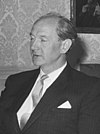Loading AI tools
The 13th government of Ireland (2 July 1969 – 14 March 1973) was the government of Ireland formed after the 1969 general election to the 19th Dáil held on 18 June 1969. It was formed by Fianna Fáil, which had been in office since the 1957 general election. This was the first election it won with Jack Lynch as its leader. It lasted for 1,352 days.
13th government of Ireland | |
|---|---|
Government of Ireland | |
 | |
| Date formed | 2 July 1969 |
| Date dissolved | 14 March 1973 |
| People and organisations | |
| President | Éamon de Valera |
| Taoiseach | Jack Lynch |
| Tánaiste | Erskine H. Childers |
| Total no. of members | 14 |
| Member party | Fianna Fáil |
| Status in legislature | Majority government |
| Opposition party | Fine Gael |
| Opposition leader | Liam Cosgrave |
| History | |
| Election | 1969 general election |
| Legislature terms | |
| Predecessor | 12th government |
| Successor | 14th government |
The 19th Dáil first met on 2 July 1969. In the debate on the nomination of Taoiseach, Fianna Fáil leader and outgoing Taoiseach Jack Lynch, the Fine Gael leader Liam Cosgrave, and the Labour Party leader Brendan Corish were each proposed.[1] The nomination of Lynch was carried with 74 votes in favour to 66 against. Lynch was re-appointed as Taoiseach by President Éamon de Valera.[2]
| 2 July 1969 Nomination of Jack Lynch (FF) as Taoiseach[3] Motion proposed by Frank Aiken and seconded by Johnny Geoghegan Absolute majority: 73/144 | ||
| Vote | Parties | Votes |
|---|---|---|
| Fianna Fáil (73), Independent (1) | 74 / 144 | |
| No | Fine Gael (49), Labour Party (17) | 66 / 144 |
| Absent or Not voting | Ceann Comhairle (1), Fianna Fáil (1), Fine Gael (1) | 3 / 144 |
| Vacancy | 1[4] | 1 / 144 |
After his appointment as Taoiseach by the president, Jack Lynch proposed the members of the government and they were approved by the Dáil.[5] They were appointed by the president on the same day.[6]
- Note
- The Department of External Affairs was renamed the Department of Foreign Affairs on 3 March 1971.[7]
On 9 July 1969, the Taoiseach announced the appointment by the Government of the Parliamentary Secretaries on his nomination.[15]
Following the dismissal of ministers, a motion of confidence in the government was proposed by Jack Lynch.[19] It was approved on a vote of 72 to 64.[20]
After the trial, Lynch placed a further motion of confidence in the government, in response to an opposition motion. This was approved on a vote of 74 to 67.[21]
The government signed the Treaty of Accession to the European Economic Community on 22 January 1972. After a referendum held on 10 May, a constitutional amendment allowing Ireland to become a member of the European Communities was approved with the support of 83.1% of votes cast. Ireland, Denmark and the United Kingdom became members of the EEC on 1 January 1973.
Wikiwand in your browser!
Seamless Wikipedia browsing. On steroids.
Every time you click a link to Wikipedia, Wiktionary or Wikiquote in your browser's search results, it will show the modern Wikiwand interface.
Wikiwand extension is a five stars, simple, with minimum permission required to keep your browsing private, safe and transparent.